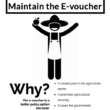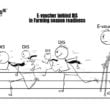CUTS centre coordinator Chenai Mukumba says government’s decision to suspend 40 percent e-voucher system by reverting to the old conventional Farmer Input Support Programme (FISP) will bring back corruption in the acquisition of farming inputs.
On June 1st, 2018, Minister of Agriculture Michael Katambo announced government’s decision to re-stream 40 per cent of the E-voucher FISP to the old system, a move which has excited the Zambia National Farmers’ Union (ZNFU).
According to ZNFU public relations manager Calvin Kaleyi, the decision by government is timely as it would help in addressing the challenges faced in the 2017/18 farming season.
But commenting on the matter in an interview with News Diggers! Mukumba said government needed to have instead looked for ways to improve the implementation of the e-voucher than going back to the old system because benefits of the e-voucher were clear for everyone to see.
“We disagree and we disapprove of the decision by government to roll back the e-voucher. I think there are a number of benefits to making the FISP programme electronic and these were indicated. Number one; you are cutting down on middlemen, number two; you are giving a choice to the farmer for them to pick. And I think of the issues that happened with the e-voucher is that first of all, they started late. There wasn’t a lot of awareness raising and sensitization on the part of farmers with regards to what it was and so we think that those issues should have been addressed before taking the decision to roll back. Because once you’ve done that, it means the inefficiency that existed in the e-voucher system essentially comes back to play and I think we are well aware that when it’s not electronic there is much more room for corruption and ransacking activities on the part of the humans that are involved in the value chain,” Mukumba said.
“So I think for us that’s our number one issue, but also just to say, maize is one of the few commodities that’s supported by the government, we are consistently saying we want to diversify the economy and it’s not just from mining but even in the agricultural sector. We need to look at other crops. The e-voucher created that opportunity. But scaling it back takes away the urgency from farmers to be able to choose what they want to put into the ground. So I think for us we have major concerns with the government deciding to roll back.”
Mukumba expressed worry that the reintroduction of the conventional FISP system would bring back the activities of corruption and theft in the farming sector which the e-voucher system was trying to eliminate.
“One of the problems with conventional FISP is that there was so much corruption. There was so much money being stolen, there were so many middlemen and even Dora [Siliya] herself when she was Minister of Agriculture, when she was explaining the shift to e-voucher, she said ‘we are moving to the electronic way of implementing FISP because it’s the most cost effective way and there is less opportunity for ransacking’, she said it. But if we are moving back to conventional, have we dealt with all those issues?” she asked.
“So I think for me, it’s so sad because even when you look at the reason why the e-voucher didn’t work, it didn’t work because farmers didn’t know how to use the visa cards. So for me, those are things we needed to address to make it more effective and then if it still doesn’t work after all that then that’s when they could have said that let’s see if the conventional way of working was better,” Mukumba said.
Mukumba insisted that government should have given the e-voucher system a little more time before rolling back 40 per cent to conventional FISP.
“This was the first year that we were rolling out the e-voucher system at 100 per cent and I think whenever you implement any programme, you are more likely than less to face tiding issues and we did see many of these issues but many of these issues really could have been addressed by timely implementation of the e-voucher. And also on the part of government by making sure that farmers are aware on how exactly they use their visa cards. For example, when they are trying to access or how much they need to put first before they can actually access the rest of the amount… those are the issues that really needed to be addressed. So we are concerned that the government chose not to address those issues and rather just gave back the programme. But already there is research starting to show that the farmers that tasted the e-voucher, many of them came and supported and saw the benefits of using that system. So rather, the government should have seen how they could improve the implementation of the e-voucher because the benefits were clear for everyone to see,” said Mukumba.












